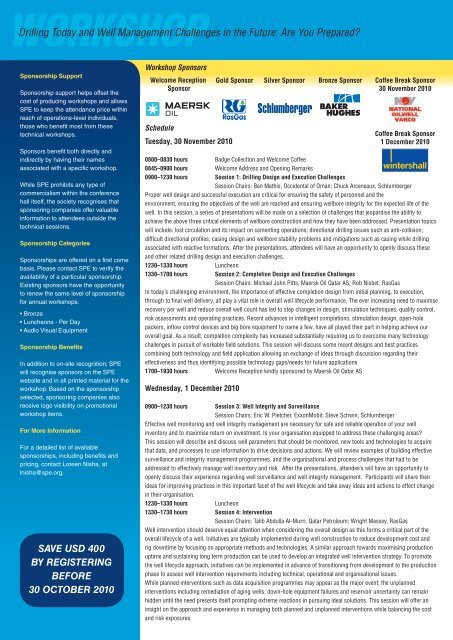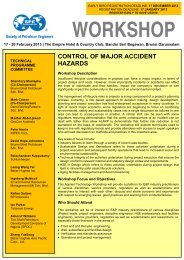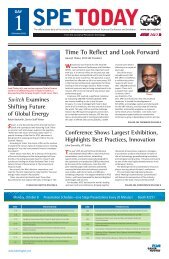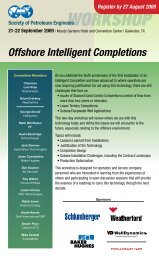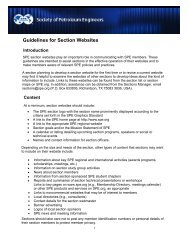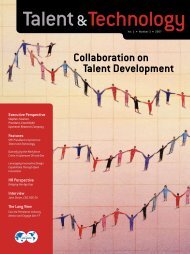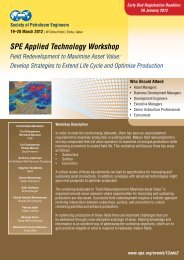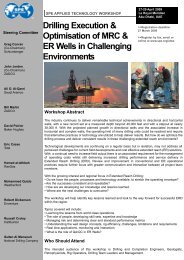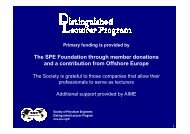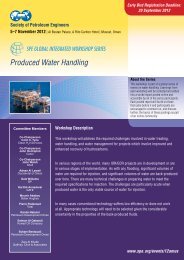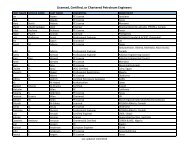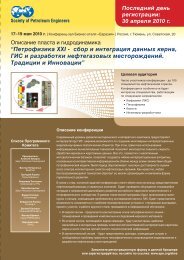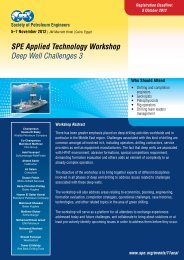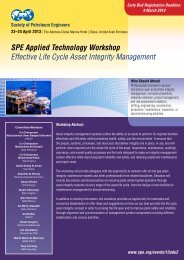Workshop Brochure - Society of Petroleum Engineers
Workshop Brochure - Society of Petroleum Engineers
Workshop Brochure - Society of Petroleum Engineers
Create successful ePaper yourself
Turn your PDF publications into a flip-book with our unique Google optimized e-Paper software.
WORKSHOP<br />
Drilling Today and Well Management Challenges in the Future: Are You Prepared?<br />
Sponsorship Support<br />
Sponsorship support helps <strong>of</strong>fset the<br />
cost <strong>of</strong> producing workshops and allows<br />
SPE to keep the attendance price within<br />
reach <strong>of</strong> operations-level individuals,<br />
those who benefit most from these<br />
technical workshops.<br />
Sponsors benefit both directly and<br />
indirectly by having their names<br />
associated with a specific workshop.<br />
While SPE prohibits any type <strong>of</strong><br />
commercialism within the conference<br />
hall itself, the society recognises that<br />
sponsoring companies <strong>of</strong>fer valuable<br />
information to attendees outside the<br />
technical sessions.<br />
Sponsorship Categories<br />
Sponsorships are <strong>of</strong>fered on a first come<br />
basis. Please contact SPE to verify the<br />
availability <strong>of</strong> a particular sponsorship.<br />
Existing sponsors have the opportunity<br />
to renew the same level <strong>of</strong> sponsorship<br />
for annual workshops.<br />
• Bronze<br />
• Luncheons - Per Day<br />
• Audio Visual Equipment<br />
Sponsorship Benefits<br />
In addition to on-site recognition; SPE<br />
will recognise sponsors on the SPE<br />
website and in all printed material for the<br />
workshop. Based on the sponsorship<br />
selected, sponsoring companies also<br />
receive logo visibility on promotional<br />
workshop items.<br />
For More Information<br />
For a detailed list <strong>of</strong> available<br />
sponsorships, including benefits and<br />
pricing, contact Loreen Nisha, at<br />
lnisha@spe.org.<br />
SAVE USD 400<br />
BY REGISTERING<br />
BEFORE<br />
30 OCTOBER 2010<br />
<strong>Workshop</strong> Sponsors<br />
Welcome Reception<br />
Sponsor<br />
Schedule<br />
Tuesday, 30 November 2010<br />
0800–0830 hours Badge Collection and Welcome C<strong>of</strong>fee<br />
0845–0900 hours Welcome Address and Opening Remarks<br />
0900–1230 hours Session 1: Drilling Design and Execution Challenges<br />
Session Chairs: Ben Mathis, Occidental <strong>of</strong> Oman; Chuck Arceneaux, Schlumberger<br />
Proper well design and successful execution are critical for ensuring the safety <strong>of</strong> personnel and the<br />
environment, ensuring the objectives <strong>of</strong> the well are reached and ensuring wellbore integrity for the expected life <strong>of</strong> the<br />
well. In this session, a series <strong>of</strong> presentations will be made on a selection <strong>of</strong> challenges that jeopardise the ability to<br />
achieve the above three critical elements <strong>of</strong> wellbore construction and how they have been addressed. Presentation topics<br />
will include: lost circulation and its impact on cementing operations; directional drilling issues such as anti-collision;<br />
difficult directional pr<strong>of</strong>iles; casing design and wellbore stability problems and mitigations such as casing while drilling<br />
associated with reactive formations. After the presentations, attendees will have an opportunity to openly discuss these<br />
and other related drilling design and execution challenges.<br />
1230–1330 hours Luncheon<br />
1330–1700 hours Session 2: Completion Design and Execution Challenges<br />
Session Chairs: Michael John Pitts, Maersk Oil Qatar AS; Rob Nisbet, RasGas<br />
In today’s challenging environment, the importance <strong>of</strong> effective completion design from initial planning, to execution,<br />
through to final well delivery, all play a vital role in overall well lifecycle performance. The ever increasing need to maximse<br />
recovery per well and reduce overall well count has led to step changes in design, stimulation techniques, quality control,<br />
risk assessments and operating practices. Recent advances in intelligent completions, stimulation design, open-hole<br />
packers, inflow control devices and big bore equipment to name a few, have all played their part in helping achieve our<br />
overall goal. As a result, completion complexity has increased substantially requiring us to overcome many technology<br />
challenges in pursuit <strong>of</strong> workable field solutions. This session will discuss some recent designs and best practices<br />
combining both technology and field application allowing an exchange <strong>of</strong> ideas through discussion regarding their<br />
effectiveness and thus identifying possible technology gaps/needs for future applications.<br />
1700–1930 hours Welcome Reception kindly sponsored by Maersk Oil Qatar AS<br />
Wednesday, 1 December 2010<br />
Gold Sponsor Silver Sponsor Bronze Sponsor<br />
C<strong>of</strong>fee Break Sponsor<br />
30 November 2010<br />
C<strong>of</strong>fee Break Sponsor<br />
1 December 2010<br />
0900–1230 hours Session 3: Well Integrity and Surveillance<br />
Session Chairs: Eric W. Pletcher, ExxonMobil; Steve Schwin, Schlumberger<br />
Effective well monitoring and well integrity management are necessary for safe and reliable operation <strong>of</strong> your well<br />
inventory and to maximise return on investment. Is your organisation equipped to address these challenging areas?<br />
This session will describe and discuss well parameters that should be monitored, new tools and technologies to acquire<br />
that data, and processes to use information to drive decisions and actions. We will review examples <strong>of</strong> building effective<br />
surveillance and integrity management programmes, and the organisational and process challenges that had to be<br />
addressed to effectively manage well inventory and risk. After the presentations, attendee’s will have an opportunity to<br />
openly discuss their experience regarding well surveillance and well integrity management. Participants will share their<br />
ideas for improving practices in this important facet <strong>of</strong> the well lifecycle and take away ideas and actions to effect change<br />
in their organisation.<br />
1230–1330 hours Luncheon<br />
1330–1730 hours Session 4: Intervention<br />
Session Chairs: Talib Abdulla Al-Murri, Qatar <strong>Petroleum</strong>; Wright Massey, RasGas<br />
Well intervention should deserve equal attention when considering the overall design as this forms a critical part <strong>of</strong> the<br />
overall lifecycle <strong>of</strong> a well. Initiatives are typically implemented during well construction to reduce development cost and<br />
rig downtime by focusing on appropriate methods and technologies. A similar approach towards maximising production<br />
uptime and sustaining long term production can be used to develop an integrated well intervention strategy. To promote<br />
the well lifecycle approach, initiatives can be implemented in advance <strong>of</strong> transitioning from development to the production<br />
phase to assess well intervention requirements including technical, operational and organisational issues.<br />
While planned interventions such as data acquisition programmes may appear as the major event; the unplanned<br />
interventions including remediation <strong>of</strong> aging wells, down-hole equipment failures and reservoir uncertainty can remain<br />
hidden until the need presents itself prompting extreme reactions in pursuing ideal solutions. This session will <strong>of</strong>fer an<br />
insight on the approach and experience in managing both planned and unplanned interventions while balancing the cost<br />
and risk exposures.


